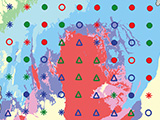Julien Guigue PhD thesis
 Influence of biotic and abiotic factors on soil organic matter dynamics assessed by the biogeochemical characterisation of soluble organic matter
Influence of biotic and abiotic factors on soil organic matter dynamics assessed by the biogeochemical characterisation of soluble organic matter
Defended on the 8th December 2014
Funding: ministry of research
Supervisors: Jean Lévêque and Olivier Mathieu
Started in October 2010
Summary
Soils are the greatest reservoir of C on the continents, and organic matter mineralisation by microbial activity represents the major part of the CO2 emitted by terrestrial ecosystems.
In this work, we studied water-extractable organic matter (WEOM), which corresponds to the more reactive fraction of soil organic matter (SOM). Our objectives were (i) to identify the relationships of WEOM dynamics with bacterial communities, and with soil physico-chemical parameters; (ii) to provide a precise chemical characterisation of WEOM.
There is a strong link between SOM solubility and the structure of bacterial communities, and an erosion of their diversity has an impact on SOM and WEOM dynamics, and leads to a decrease in organic matter mineralisation. A study at the regional scale then allowed us to identify that the SOM and clay contents control the quantities of WEOM and its aromaticity. The WEOM characterisation at the molecular level revealed the presence of a large number of ubiquitous molecules in the WEOM. Based on these analyses, we were also able to describe the effects of vegetation and soil physico-chemical properties on the chemical composition of WEOM.
Keywords
soil biogeochemistry, water-extractable organic matter, bacterial community, molecular characterization, FTICR-MS, 13C, 3D-fluorescence
Jury
Philippe Amiotte-Suchet, université de Bourgogne – examinateur
Richard Bardgett, University of Manchester – rapporteur
Claire Chenu, AgroParisTech – rapporteur
Sylvie Dousset, université de Lorraine – examinateur
Stéphane Mounier, université de Toulon – examinateur
Philippe Schmitt-Kopplin, Technische Universität München – examinateur
- extrait:
- lien_externe:
- kc_data:
- a:8:{i:0;s:0:"";s:4:"mode";s:0:"";s:3:"css";s:0:"";s:9:"max_width";s:0:"";s:7:"classes";s:0:"";s:9:"thumbnail";s:0:"";s:9:"collapsed";s:0:"";s:9:"optimized";s:0:"";}
- kc_raw_content:
 Influence of biotic and abiotic factors on soil organic matter dynamics assessed by the biogeochemical characterisation of soluble organic matter
Influence of biotic and abiotic factors on soil organic matter dynamics assessed by the biogeochemical characterisation of soluble organic matterDefended on the 8th December 2014
Funding: ministry of research
Supervisors: Jean Lévêque and Olivier Mathieu
Started in October 2010
Summary
Soils are the greatest reservoir of C on the continents, and organic matter mineralisation by microbial activity represents the major part of the CO2 emitted by terrestrial ecosystems.
In this work, we studied water-extractable organic matter (WEOM), which corresponds to the more reactive fraction of soil organic matter (SOM). Our objectives were (i) to identify the relationships of WEOM dynamics with bacterial communities, and with soil physico-chemical parameters; (ii) to provide a precise chemical characterisation of WEOM.
There is a strong link between SOM solubility and the structure of bacterial communities, and an erosion of their diversity has an impact on SOM and WEOM dynamics, and leads to a decrease in organic matter mineralisation. A study at the regional scale then allowed us to identify that the SOM and clay contents control the quantities of WEOM and its aromaticity. The WEOM characterisation at the molecular level revealed the presence of a large number of ubiquitous molecules in the WEOM. Based on these analyses, we were also able to describe the effects of vegetation and soil physico-chemical properties on the chemical composition of WEOM.
Keywords
soil biogeochemistry, water-extractable organic matter, bacterial community, molecular characterization, FTICR-MS, 13C, 3D-fluorescence
Jury
Philippe Amiotte-Suchet, université de Bourgogne – examinateur
Richard Bardgett, University of Manchester – rapporteur
Claire Chenu, AgroParisTech – rapporteur
Sylvie Dousset, université de Lorraine – examinateur
Stéphane Mounier, université de Toulon – examinateur
Philippe Schmitt-Kopplin, Technische Universität München – examinateur
